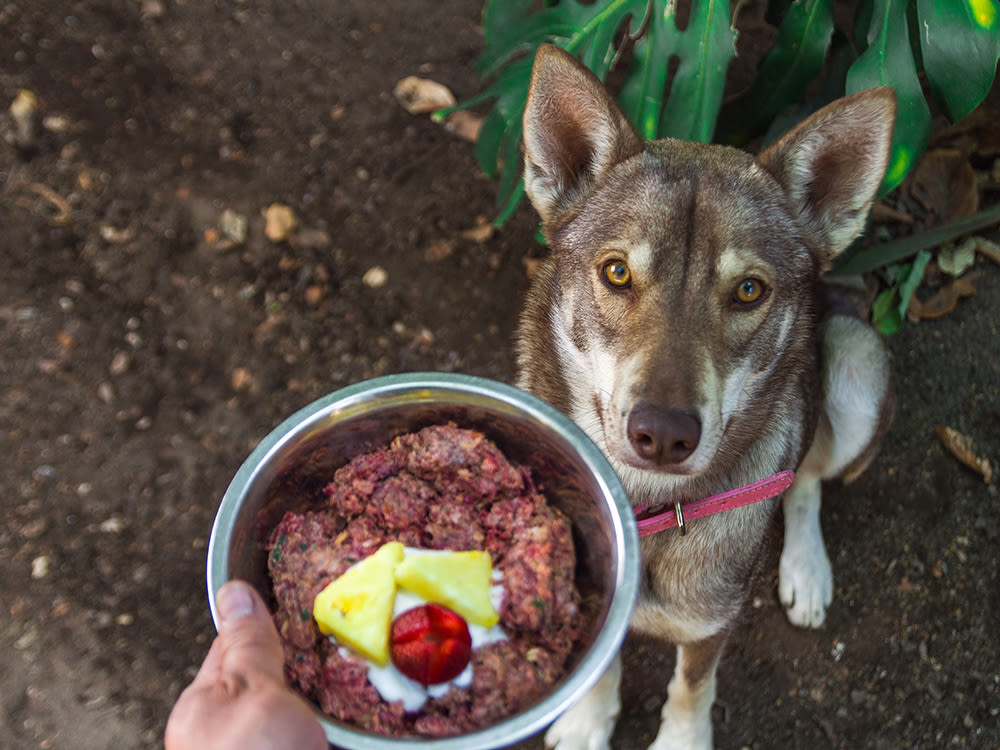Here at Belltrees, we believe feeding a raw & species appropriate diet plays an important role in maintaining a healthy fulfilled life with our pet!
We have only the freshest human grade meats available for purchase in a range of various proteins.
Beef
Beef can be a nutritious addition to your dog’s diet when prepared properly. Here are some benefits of feeding beef to dogs:
Maintains and Supports Muscle Growth: Beef is a quality source of protein, which helps dogs build and maintain muscle mass.
Improves Exercise Performance: The protein in beef provides energy, enhancing your pup’s exercise performance.
Anemia Prevention: Beef contains iron, which supports red blood cell production and oxygen transportation.
Healthy Coat and Skin: The vitamins and minerals in beef contribute to a shiny coat and healthy skin.
Weight Management: Lean cuts of beef can help maintain a healthy weight for your dog.
Excellent Protein Source: Beef contains all essential amino acids needed for various bodily functions.
Zinc, Iron, and More: Beef is rich in essential nutrients like zinc, iron, selenium, and vitamins B12, B3, and B6.
Chicken
Chicken can indeed be a nutritious addition to your dog’s diet!
Muscle Health: Chicken is an excellent source of protein and essential amino acids, which support your dog’s muscle health. These nutrients are crucial for maintaining strong muscles and overall vitality.
Omega-6 Fatty Acids: Chicken contains Omega-6 fatty acids, which have several benefits:
Nutrient Absorption: These fatty acids aid in nutrient absorption, ensuring your dog gets the most out of their food.
Inflammation Management: Omega-6s play a role in managing inflammation, which is essential for overall health.
Healthy Skin and Fur: They contribute to maintaining healthy skin and a shiny coat.
Remember that while chicken is generally safe for dogs, some may be allergic to it. Signs of a chicken allergy include diarrhea, vomiting, ear infections, itchiness, foot infections, obsessive licking, and skin issues. If you notice any of these symptoms, consult with a veterinarian.
Pork
Feeding pork to dogs can offer several potential benefits.
High-Quality Protein: Pork is a rich source of protein, which is essential for muscle development and energy in dogs. It provides the necessary amino acids to support their overall health.
Digestibility: Pork meat is highly digestible, making it easier for dogs to process and absorb the nutrients. This can be especially beneficial for dogs with sensitive stomachs.
Vitamins and Minerals: Pork contains essential vitamins and minerals, including vitamins B6 and B12, niacin, phosphorus, and zinc. These nutrients contribute to your dog’s overall well-being.
Immune System Support: Organs such as the heart and liver found in pork contain vital vitamins and minerals that can help boost your dog’s immune system.
Green Tripe
Green tripe is a nutritious food that has gained popularity in natural and holistic dog diets.
Probiotics: Raw green tripe contains Lactobacillus acidophilus, a beneficial bacteria originating from an animal’s gut. It helps improve gut health by controlling harmful bacteria like Escherichia coli and Salmonella, thus promoting better gut immunity.
Essential Fatty Acids: Green tripe provides a good balance of omega-3 (anti-inflammatory) and omega-6 fatty acids. These are essential for overall health, skin condition, and coat quality.
Skin and Coat Health: Green tripe can lead to an improvement in skin and coat condition. It’s particularly beneficial for dogs with allergies and skin issues.
Digestive Health: Tripe supports healthy digestion and nutrient absorption. It can help soothe gastrointestinal upsets and reduce digestive disorders.
Immune System Boost: The natural goodness in green tripe assists in building a robust immune system.
Muscle Health: It contributes to healthy muscle development in dogs.
Remember that your dog’s unique nutritional needs should be discussed with a veterinarian before introducing any new food. While green tripe offers numerous benefits, individual responses may vary. If you decide to incorporate it into your dog’s diet, opt for the unprocessed, green variety to retain maximum nutritional value.
Emu
Emu meat is a protein-rich option that can be beneficial for your furry friend. Here are some reasons why feeding emu to dogs can be advantageous:
Low in Fat: Emu meat is very low in fat, making it a suitable choice if your dog needs to maintain a healthy weight and lean muscle mass.
High in Protein: The high protein content in emu meat supports muscle growth and overall health. It’s an excellent alternative to more common meats like chicken or beef.
Rich in Vitamins: Emu meat contains essential vitamins such as B12, B6, A, C, and D. These vitamins contribute to red blood cell growth, a healthy nervous system, and immune system strength.
Iron-Rich: Emu meat provides twice as much iron as beef, which is essential for overall well-being.
Allergy-Friendly: Emu meat is a novel treat suitable for pets with allergies or dietary sensitivities. It’s a great substitute for dogs on food elimination diets.
Supports Bone Health: Adequate vitamin D from emu meat helps maintain proper calcium levels, promoting strong teeth and bones in dogs.
Antioxidant Properties: The vitamin C content in emu meat acts as an antioxidant, reducing free radicals and supporting immunity.
Remember to introduce new foods gradually and monitor your pet’s response. Emu meat can be a healthy addition to your dog’s diet, especially if they have specific dietary needs or allergies.
Kangaroo
Kangaroo meat offers several nutritional benefits for dogs.
Lean Protein: Kangaroo meat is the leanest available source of red meat. Its protein-to-fat ratio is near-unmatched in the red meat family. This makes it an ideal option for dogs, especially those with sensitivities or allergies to traditional protein sources like beef or chicken.
Healthy Fats: While kangaroo meat contains a small amount of fat, it’s primarily unsaturated fat, which is healthy for your pup. In moderation, unsaturated fat is crucial for a balanced diet. Combining roo meat with veggies ensures your dog receives the right amount of healthy fats.
Rich in Iron and Zinc: Kangaroo meat is high in iron and zinc. Iron helps create red blood cells, bolstering the immune system and supporting bodily growth. Zinc boosts energy, strengthens coats, and aids iron in reinforcing the immune system. These nutrients help keep your pooch in peak form.
Low-Fat Option: The low-fat nature of kangaroo meat can benefit dogs with certain health conditions. It promotes weight management and reduces the risk of pancreatitis.
Remember to consult your veterinarian before introducing any new food to your dog’s diet.
Turkey
Turkey can be a nutritious addition to your dog’s diet when introduced responsibly. Here are some reasons why it’s a good choice:
High-Quality Protein Source: Turkey provides lean and easily digestible protein, essential for muscle development, tissue repair, and maintaining a healthy coat and skin. It’s especially beneficial for dogs with sensitivities to other meats.
Rich in Essential Nutrients: Beyond protein, turkey is a treasure trove of vitamins, minerals, and amino acids. These nutrients contribute to overall well-being, including muscle health, red blood cell production, bone health, immune function, metabolism, and energy.
Omega-3 Fatty Acids: Turkey contains omega-3 fatty acids, which support healthy skin and coat.
Remember to prepare turkey in a dog-friendly manner: cook it plain without seasoning, remove the skin, and ensure it’s fully cooked to avoid bacterial risks.
Duck meat can indeed be a nutritious addition to your canine companion’s diet. Let’s explore the benefits of feeding duck to dogs:
Good Source of Protein: Dogs require high-quality animal protein, and duck meat fits the bill. It’s considered one of the best protein sources for our furry friends.
Amino Acids: Beyond protein, duck provides essential amino acids. These building blocks are crucial for muscle development, tissue repair, and overall health.
Rich in Fatty Acids: Duck meat contains healthy fats, including omega-3 fatty acids. These fats support skin health and contribute to a glossy coat.
Alternative for Picky Eaters and Allergic Dogs: If your dog is finicky or has food allergies, duck can be a great alternative to more common proteins like chicken or beef.
B Vitamins: Duck is fortified with B vitamins, including niacin (Vitamin B3). Niacin helps regulate glucose levels in the body, promoting overall well-being.
Antioxidants: Duck meat offers antioxidants that help protect cells from damage and support immune function.
Remember to prepare duck properly: feed it cooked without seasoning and avoid giving your pup duck bones. Consult your veterinarian before introducing any new food to your dog’s diet.
Lamb
Lamb is a red meat that is perfectly safe for dogs to consume. In fact, it offers several health benefits:
High-Quality Protein: Lamb is a well-rounded source of protein, containing essential amino acids. These amino acids are crucial for muscle development, tissue repair, and overall health.
Rich in Nutrients: Lamb provides more energy, vitamin A, calcium, magnesium, and iron compared to beef. It also contains higher amounts of vitamin B12 and vitamin B-9 (folate) than chicken. These nutrients support muscle growth, coat health, and overall vitality.
Healthy Fats: Lamb meat is rich in dietary fats that help sustain energy levels. Additionally, it contains omega-3 fatty acids, which promote healthy skin and coat.
Digestibility: Lamb has one of the highest digestibility scores among meats, making it beneficial for gut health. It beats meats like beef in terms of digestibility.
Fish
Fish is an excellent addition to your dog’s diet, offering a plethora of health benefits.
Rich in Protein: Fish provides easily digestible protein, essential for muscle growth and maintenance. Whether your dog is recovering from digestive issues or needs a low-fat protein source, fish fits the bill.
Omega-3 Fatty Acids: Fish is a treasure trove of omega-3 fatty acids, which have several advantages:
Decreasing Inflammation: Omega-3s help reduce inflammation, benefiting dogs with joint issues, inflammatory bowel disease (IBD), and allergies.
Skin and Coat Health: These fatty acids promote healthy skin, a glossy coat, and overall well-being.
Vitamins and Minerals: Fish contains essential nutrients like calcium, magnesium, selenium, zinc, phosphorus, iodine, and iron. These minerals contribute to overall health and vitality.
Natural Anti-Inflammatory: The vitamins, minerals, and omega-3s in fish act as a natural anti-inflammatory, making it ideal for dogs with allergies or intolerances to other proteins.
Weight Control: Fish is low in saturated fats and empty calories, making it suitable for weight management.
Venison
Venison, the delectable meat derived from deer, has garnered attention as a potential dietary option for our canine companions.
Rich Source of High-Quality Protein: Venison stands out as an exceptional source of high-quality protein, which is fundamental for dogs. Essential amino acids found in venison contribute to muscle development, tissue repair, and overall health. Its lean nature ensures that the protein is well-absorbed, making it an excellent option for dogs with sensitivities to more common meat sources.
Nutritional Diversity: Beyond protein, venison offers a diverse range of essential nutrients crucial for a dog’s well-being:
B Vitamins: Venison is rich in B vitamins such as B12 and niacin, which are vital for energy metabolism.
Minerals: It contains minerals like iron and zinc, supporting various physiological functions1.
Omega-3 Fatty Acids: Venison provides important omega-3 fatty acids, which have several advantages:
Reducing Inflammation: Omega-3s help reduce inflammation, benefiting dogs with joint issues, inflammatory bowel disease (IBD), and allergies.
Skin and Coat Health: These fatty acids promote healthy skin and a glossy coat.
Balanced Approach:
It is important when feeding a raw diet, that you balance it accordingly.
If you are unsure about how to feed your dog or cat correctly, get in touch with one of our knowledgeable staff members.
Always prioritize a balanced approach, consulting with a veterinarian to ensure the dietary choices align with the specific needs of individual dogs.
Pre – Made Diet



